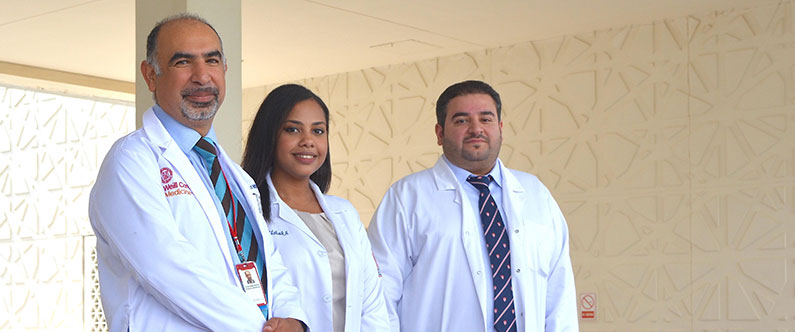Botox injections in stomach ineffective against obesity, say WCM-Q and HMC researchers
 From left: WCM-Q researcher Dr. Shahrad Taheri, WCM-Q student research assistant Hadya Elshakh and HMC’s Dr. Khalid Al-Ejji outside WCM-Q. The researchers found that botox injections to the stomach do not aid long-term weight loss.
From left: WCM-Q researcher Dr. Shahrad Taheri, WCM-Q student research assistant Hadya Elshakh and HMC’s Dr. Khalid Al-Ejji outside WCM-Q. The researchers found that botox injections to the stomach do not aid long-term weight loss.
Using botox injections to the stomach to treat obesity does not lead to long-term weight loss, a study by researchers at WCM-Q and Hamad Medical Corporation (HMC) has found.
Botox, more commonly used as a cosmetic treatment to reduce the appearance of skin wrinkles, works by causing partial muscle paralysis that makes the overlying skin look smoother. The theory behind botox injections to the stomach is that by paralyzing the muscles involved in moving food the stomach will feel fuller, helping the patient feel less hungry, eat less and lose weight.
However, after a comprehensive review of all published papers on the subject, the WCM-Q and HMC researchers found no evidence that stomach botox injections in obese patients leads to effective long-term weight loss. Furthermore, botox injections to the stomach can also cause harmful side-effects, such as pain and swelling in the area of the injection, nausea and indigestion.
The quality of the studies examining the role of stomach botox in weight loss was generally poor, the WCM-Q and HMC researchers found. Some studies reviewed by the researchers reported that obese patients who had stomach botox injections had lost weight after one month, and patients reported feeling full earlier after eating less food than previously. But in most studies, after three to six months, patients had either regained the weight they had lost, weighed more than they did before the procedure, or had minimal total body weight loss. Other studies examined by the team found little difference in appetite, weight loss and feelings of fullness between subjects who had botox injections with those who had saline injections. The only trial that demonstrated significant total body weight loss placed all participants on a very low-calorie liquid diet for eight weeks. Furthermore, the effect of the botox injections wears off after three to six months.
Hadya Elshakh, a final-year WCM-Q medical student and volunteer Research Assistant in the college’s Clinical Research Core, is the lead researcher on the review. She said:
“We examined a large number of research studies, both clinical trials and case-based studies, and found no compelling evidence for the use of botox injections to the stomach for treatment of obesity. It does not appear to lead to long-term weight loss.”
Botox – or botulinum toxin type A (BTX-A) to give it its full name – is a neurotoxin produced by the bacterial species Clostridium botulinum that causes partial paralysis by blocking the release of a neurotransmitter called acetylcholine. The toxin has been used with some success as treatment for various medical conditions, such as muscle spasms caused by stroke or spinal-cord injuries, among many others. As a treatment for obesity, physicians use an endoscope to allow them to inject the BTX-A into the gastric muscles.
Unfortunately, while the treatment appears to have been successful in early animal studies, the data available from humans do not suggest that it leads to sustained weight loss, the review concludes. The paper, which is entitled The Role of Endoscopic Intra-Gastric Botulinum Toxin-A for Obesity Treatment, has now been published in Obesity Surgery, one of the world’s foremost obesity journals. Dr. Khalid Al-Ejji of the Department of Gastroenterology at HMC, also contributed to the study. Dr. Al-Ejji, who also works in HMC’s National Obesity Treatment Centre, part of the Qatar Metabolic Institute, said:
“Obesity is a major problem in our region, and indeed, worldwide. It is therefore essential to provide evidence-based treatments for obesity. We hope that our work will help to improve current practices and patient care.”
Dr. Shahrad Taheri, professor of medicine and assistant dean for clinical investigations at WCM-Q, and lead consultant physician in obesity at the National Obesity Treatment Centre at HMC, also contributed to the study. He said: “Most of the clinical trials we reviewed showed that while some obese patients who had endoscopic intra-gastric BTX-A treatment reported early satiety and delayed gastric emptying, that did not translate into significant or sustained total body weight loss. Given that injecting botox into the stomach muscles can also result in undesirable side effects, and given that its effectiveness has not been proven, it is not to be recommended as a treatment for obesity.”
Read the full research paper